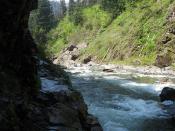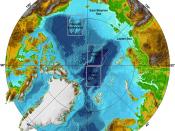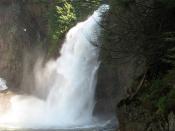The Yellowknives are a small tribe of Indians that are a part of a much larger grouping of Indians known as the sub-arctic Indians. As you see, the sub-arctic Indian land area is immense, and extends across the whole northern top of Canada and extends westward to Alaska. The Sub-arctic culture area stretches from the Labrador Sea to within a few miles of the Bering Sea, and encompasses six Canadian Provinces, two Territories, as well as much of Alaska. The northern boundary between Arctic and Sub-arctic shows up in the vegetation change from treeless tundra (Arctic) to forests (evergreens in the west and evergreens mixed with deciduous species in the southeast). The area is a vast, harsh one within which to live, a land of physiographic and seasonal climatic extremes.
"The climate is characterized by short, warm, bright summers, low precipitation, and long, exceedingly cold winters. The vegetation and topography are varied, from mountains to swampy, coniferous forests, from high plateaus and prairies to lakes, swamps, and rivers.
Vegetation in the forests includes spruce, birch, aspen, cottonwood, and pine, to name a few. Vegetation edible by humans is very sparse, but berries of many kinds are plentiful; including blueberries, cranberries, gooseberries, serviceberries and raspberries. In the forests game of many different kinds abounds, including moose, some deer and elk, woodland caribou, along with various fur-bearing animals. In the many streams and lakes fish are plentiful and include salmon, pike, whitefish and other anadromous and freshwater species. Migratory waterfowl visit the region by the tens of thousands in spring and fall. Although regarded as an uninviting and unforgiving land by non-natives (explorers, traders, missionaries, governmental agents), it has been home for many thousands of years to Native people whose twentieth century descendants speak Algonquian, or Athapaskan, or more recently, French or...


